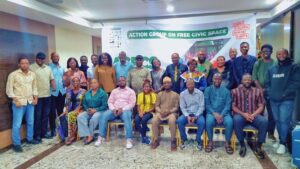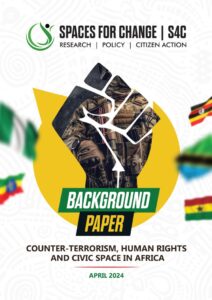“Building civic power through collective action” was the theme of the 2024 annual retreat of the Action Group on Free Civic Space (AGFCS) which united 25 member-organizations of the coalition in Lagos between March 20-22, 2024. Over the past three years, AGFCS members have coalesced to implement projects aimed at protecting civil liberties—especially the freedom of expression, association, and assembly—from all forms of encroachment by state and non-state actors. During the three days of the retreat, AGFCS members reflected on the projects they implemented across Nigeria’s six geographical regions in the past year, took stock of the progress made, the challenges encountered, and brainstormed new action plans to close identified gaps.
The first day of the retreat focused on the development of the coalition’s collective programmatic strategy. What are the drivers and enablers of shrinking the civic space in Nigeria? How best can civil society organizations effectively defend democracy and the spaces for democratic engagement? How can civil society organizations build civic power to push back and navigate difficult operating environments? Should they disrupt, transform or reform the security architecture that is increasingly becoming the dominant driver of shrinking civic space, across the world, and of course, in Nigeria? Discussion of these concepts enhanced understanding of mechanisms and strategies that offer entry points for increased protection of civic spaces such as the judicial activism, digital literacy, public interest litigation, policy reform, capacity building and strategic engagement with key sectors.
The second day of the retreat featured the sharing of disparate experiences of project implementation across regions. While many interventions recorded major wins, others just laid the foundation for future action or targeted engagement with key sectors. For instance, members implemented projects that subjected the policing activities of state- and regional security initiatives in the South-East, South-West and North-West of Nigeria to independent interrogation to gauge their consistency with human rights standards while creating new spaces for them to take part in mainstream discourses on civic space protection for the first time. Overall, the distinctions, and commonalities in project outcomes as well as the popular trends observed across regions became even more apparent, paving the way for collective ideation on the next steps.
The third day of the retreat harped on sustainability, compliance and operating safely as human rights defenders and civil society organizations. Pushing back on restrictions on the civic space is often fraught with risks which advocates must be aware of, and be prepared for. The session walked members through their regulatory compliance obligations under extant laws in Nigeria, while underlining the need for organizations to improve their compliance culture. The success of this session can be gleaned from the honest concerns some members raised regarding their non-compliant status and how to address them timeously.
In a nutshell, the retreat transcends an annual gathering of advocates, but a safe space for reflection, reunion and coordination. Most importantly, it remains AGFCS members’ strongest weapon for strengthening the bonds of solidarity. AGFCS activities are supported by the Fund for Global Human Rights, with Spaces for Change | S4C serving as the coalition’s Secretariat.





















